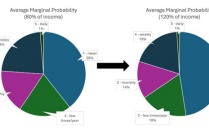Redefining Vulnerability and Community Resilience in Seattle, WA and Buffalo, NY
By Jasleen Kaur, University of North carolina at chapel hill
Advisors: Susan Clark, EVS, University at Buffalo
Advisors: michael shelly. renew, University at Buffalo
Project Objectives
•Seattle: study relationship between personal characteristics and places of importance using data from SCORE project
•Buffalo: develop framework for community resilience survey to assess disaster readiness in Buffalo’s vulnerable neighborhoods
Data and Results
•Seattle:
• Ordinal logistic regression: vulnerable households which rely more on food banks are more likely to face transportation limitations and have lower income
•Average marginal probabilities: higher income shifts households toward never using food banks
•Buffalo: data collection ongoing; analysis not yet begun
Significance
•Seattle: new way to define vulnerability. Previous efforts use sociodemographic census data. Our method looks at behavioral dependency on critical services, allowing us to reach same conclusion and understand underlying inequities.
•Buffalo: analysis will equitably allocate most critical resources and services that improve daily wellbeing in both daily life and during disasters in neighborhoods
Publication or Conference
Submitted abstract for American Geophysical Union 2025 annual meeting for poster session
------------------------------------------------------------------------------------------------
Center for Geological and Climate Hazards
Interdisciplinary Research Experience for Undergraduates in Atmospheric and Geological Hazards

Results from Seattle project: how a 40% income change shifts food pantry usage (all other factors constant).